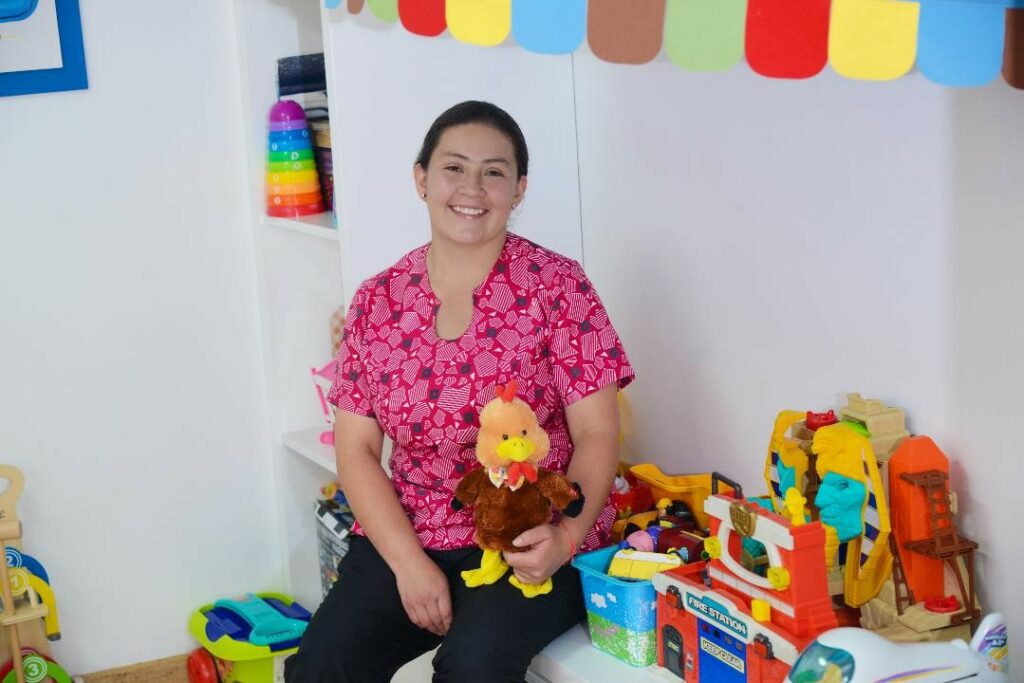
OPPORTUNITY
Approximately 20 million people in Latin America are engaged in paid domestic work, primarily taking care of children and the elderly, and performing multiple tasks for the maintenance of a household. The labor market for domestic work is mainly comprised of women and migrants, who account for 93% and 17% of all domestic workers, respectively.1 Despite their valuable contributions, domestic workers are often subject to precarious working conditions including long working hours, low wages, unpaid labor and little to no social protection.
Laws are not the issue. Sixteen countries in Latin America have ratified ILO Convention 189, which established guidelines to guarantee rights and social protection for domestic workers. While regulatory frameworks have improved in many signatory countries, compliance levels remain low. Lack of awareness, cultural attitudes, poor government oversight and cumbersome registration processes all contribute to high levels of informality, which in turn make it more likely for workers to be victims of abuse. Nearly 80% of women in domestic employment operate without a formal labor contract in the region, with informality rates ranging from 63% in the Southern Cone to 82% in the Andean region, and as high as 98% in Central America.1
Symplifica was created as a software-as-a-service solution to formalize payroll and benefits management of domestic workers in Colombia, where nearly 90% of domestic workers have verbal contracts and 61% earn less than the minimum legal wage. Symplifica was born out of Colombian incubator InQLab through an initial investment of COP1.8b (~USD550k) in 2016. The company was initially led by engineer Camilo Mendez and marketing expert Salua Garcia.
Around the same time – only within two weeks of Symplifica’s creation – a team led by Omar Perdomo founded Larnia, a startup that shared a similar vision and also offered HR solutions to manage domestic workers in Colombia. After competing for two years, Larnia and Symplifica decided to join forces through a merger that kept the Symplifica brand in a platform co-led by both Salua and Omar. Through this merger, Symplifica doubled its user base and combined part of both companies’ teams and products. As the company continued to grow, Salua and Omar sought institutional partners to support their strategic vision to reach more workers, expand their product offering and enter other markets in Latin America.
EXECUTION
In late 2021, Symplifica closed a USD3m pre-series A round led by the Soros Economic Development Fund, the Open Society Foundation’s impact investing arm. ALIVE Ventures and InQLab also participated in the round, with ALIVE contributing USD500k. The round was closed during the COVID-19 pandemic, when many domestic workers had their verbal contracts cancelled or suspended without access to benefits mandated by law, highlighting the need and opportunity for the services offered by Symplifica.
One of the biggest headwinds that Symplifica has faced has been changing the mindset of potential clients, as both households and workers are used to managing labor relations informally and are often unaware of regulations. As a result, the company is adopting a twofold strategy that consists of (1) improving the value proposition of its offering through additional services revolving around the care economy and (2) building communities on social media to raise awareness of the advantages of formalization.
Seeking to generate greater impact on domestic employees and increase client retention, the company launched Symplifica Trabajador@s in 2022. Through this mobile app, employees can access payroll advances, loans, insurance, education programs and other services offered through partnerships with corporates, foundations and universities. Symplifica also launched its operations in Mexico in its first step towards regional expansion. Within one year of closing its pre-series A round, the company grew its revenue by 56%, mainly tied to a 40% growth in subscriptions. As of June 2023, over 12,000 households are actively managing their employees through Symplifica.
ALIVE has continued to support the growth of Symplifica by encouraging the development of clear internal structures, governance, and sustainable goals for the company. As part of its post-investment process, ALIVE has a designated Technical Assistance Facility (TAF) to support companies across different projects while strengthening social impact. Through the TAF of its first fund, ALIVE financed a project to identify strategies to support the company’s long-term objectives. ALIVE also supported the company in structuring a financial planning strategy, proposed the creation of a compensation committee, and reaffirmed its commitment through a bridge financing round in Q2 2023 to cover capital needs for the next 18 months.
ESG IN FOCUS
Symplifica’s business model intrinsically has a positive impact. To date, the company has formalized over 30,000 jobs in Colombia, out of which 97% are women and 56% are single mothers. Symplifica has transferred over USD18m to the social security system on behalf of domestic workers, allowing many women to access pension, healthcare insurance and maternity leave for the first time. In addition, workers affiliated with Symplifica receive higher wages, with full-time workers earning 9% above the legal minimum wage and part-time workers enjoying an average salary that is 61% higher than the legal minimum wage.
Through the TAF of its first fund, ALIVE also hired impact measurement firm 60 Decibels to better understand how the company is impacting employers and domestic workers. As a direct result of this initiative, Symplifica published its first impact report in 2022. Key findings included that 65% of domestic workers feel like their lives have improved and 83% of employers feel like they now have greater peace of mind to comply with all regulations.
In addition, ALIVE also supported the company in the implementation of a gender integration project through a partnership with Value for Women (V4W). The project included an in-depth diagnosis of the company’s gender practices, as well as tangible strategies to apply a gender lens to the company’s policies and operations.
1 ILO (2019) and UN Women (2020).
You may be interested in...
-

Lightrock | dr.consulta
In December 2017, Lightrock invested in dr.consulta, a Brazil-based clinic chain that...
-

Elevar Equity | TICMAS
In June 2018, Elevar Equity invested in TICMAS, an education platform with operations in...
-

Vinci Partners | Pro Infusion
In November 2020, Vinci Partners invested in Pro Infusion, a Brazil-based outsourcing...
-

L Catterton | NotCo
In August 2020, L Catterton invested in NotCo, a Chile-based foodtech company that...